Official Says Iran's Claim Of Self-Sufficiency In Medicines Not True

An official of Iran’s drug importers union says official claims of self-sufficiency in production of raw materials for medicine and pharmaceutical products is not true.

An official of Iran’s drug importers union says official claims of self-sufficiency in production of raw materials for medicine and pharmaceutical products is not true.
In an interview with Iran’s labor news agency on Sunday, the deputy head of the Iranian Pharmaceutical Importers Association, Mojtaba Bourbour, said about 80 to 90 percent of the needed raw materials are imported from China and India. He added that some medicines are imported from China but sold as made in Iran.
Noting that there is no precise data on the amount of the imports of drugs packaged abroad, Bourbour said that unofficial figures indicate a $400 million dollar decrease to about $700 million since last year.
He added that most of Iran’s imports of packaged medicines are from the United States and European countries, followed by India and Turkey.
He also criticized the government’s policies that led to the decrease in imports, warning that medication prices may rise dramatically in the coming months as a result ofrestrictions by the health ministry and not foreign sanctions.
Also on Sunday, Iran’s Health Minister Bahram Eynollahi talked of further restrictions on imports of medicine and pharmaceutical products, while the Food and Drug Administration announced a ban on the imports of COVID-19 vaccines.
Eynollahi urged people to trust drugs made in Iran and warned Iranian doctors against prescribing foreign brands of medicine.
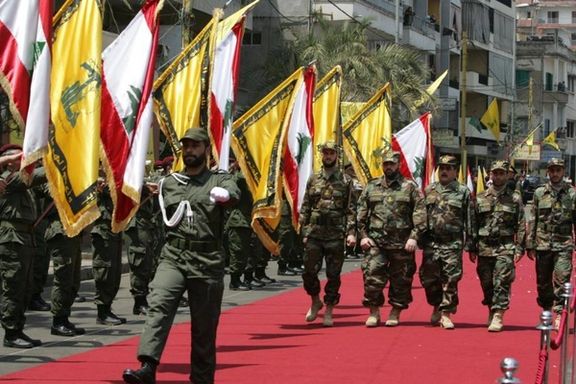
Iran’s Revolutionary Guard and Lebanon’s Hezbollah have reportedly started construction work to expand two old military bases near the Syrian capital Damascus.
According to a report by the Syrian Observatory for Human Rights (SOHR) on Sunday, they are turning the compounds into training and operations centers with underground facilities to store drones and weapons.
The report said that Hezbollah forces have driven out farmers from the nearby village of Khirbet al-Ward to prevent filming of their activities in and around an old military base, which is located near the town of Sayyidah Zaynab south of Damascus.
Construction work with excavators has also started around the Dimas airbase, west of the capital, the report added, claiming that shipments of weapons and drones will be concealed in basements there, probably replacing the Tiyas Military Airbase in the Homs area that was reportedly targeted by Israeli airstrikes.
SOHR added that shipments of weapons and ammunition as well as parts to assemble drones have been delivered to the military airbase in Dimas, which is now under almost full control of the IRGC and Iran-backed militias.
Israeli warplanes have fired missiles at the port in the coastal city of Latakia, twice in less than a month causing destroying “a large number of containers,” of weapons shipped from Iran.
Israel conducts attacks at Iranian supplies headed for the Lebanese Hezbollah and other proxy forces.
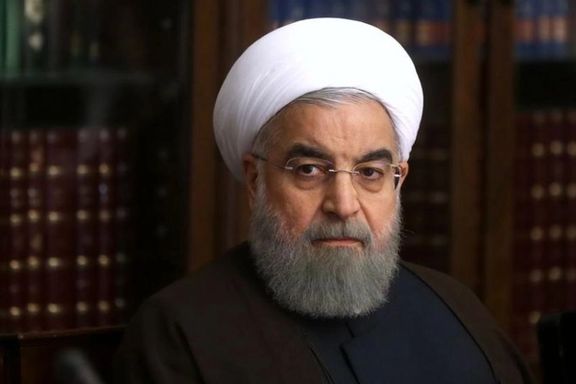
The son-in-law of Iran’s former president has said that a recent meeting between Hassan Rouhani and Iran’s leader Ali Khamenei was “normal and intimate”, rejecting rumors to the contrary.
In an interview with Sharq newspaper published on Sunday, Kambiz Mehdizadeh made the comments in reaction to numerous reports about the content and tone of the meeting, Rouhani’s first since his term ended in early August.
News of the meeting that was disclosed by Mohammad Mohajeri, an editorial-board member of Khabar Online website, sparking a lot of speculations and interpretations on the Iranian political scene.
Some sources said that during the meeting Rouhani warned the Supreme Leader over the perils of delaying a nuclear deal with the West and urged establishing relations with the United States before Iran’s economic crisis endangers the regime.
The rumors that Mehdizadeh was rejecting were about remarks by Iranian conservative political analyst Abbas Salimi Namin, who reportedly said Rouhani had asked Khamenei to appoint him as a member of the Expediency Discernment Council, but the leader rejected it.
The Council was originally set up to resolve differences or conflicts between the parliament and the Guardian Council, but it is primarily an important advisory body with some supervisory powers whose members are chosen by Khamenei every five years.
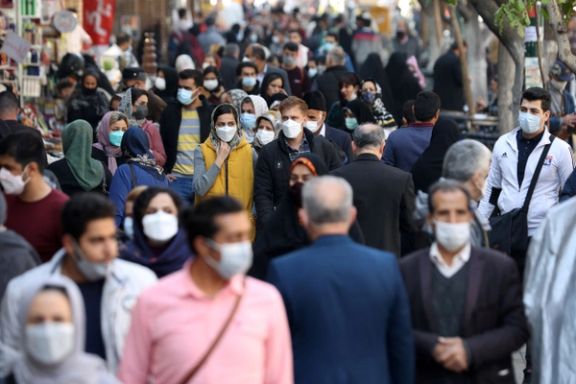
A conservative news website in Tehran has published readers' comments about the nuclear talks and Iran's economic crisis, that despite censorship are revealing.
The comments, if published on any website in Iran, are strictly moderated to avoid possible insult against state officials, yet they reveal how the Iranian society perceives developments reported by the media.
Commenting on how likely is a nuclear agreement between Iran and the West, one reader said on Alef website, "Clearly Iran should fulfil its commitments under the JCPOA. An agreement would be possible if Iran does so, otherwise, there will be no agreement." As the comment looks contrary to Tehran's official view, the website replied: "Let the West do it first for once."
Another reader commented: "The United States wishes to return to the JCPOA so that it could activate the trigger mechanism and return all the UN resolutions against Iran. What the Iranian people want is a sustainable long-term agreement with the West."
Yet another user said: "We, and not the West, urgently need to negotiate and to reach an agreement. It is our economy that suffers from an 85-percent inflation [in some cases], not their economy. Prices change by the hour here, not in the West. Almost everyone has come to the conclusion that what we needed in Iran is an end to sanctions rather than a change of government."
The website replied that due to the mismanagement of the economy during the past 50 years, the rise in inflation will continue even if the sanctions are lifted.
Recently, when Iranian officials admit serious problems like inflation and drought, they refer to 50 years, to include the last few years of monarchy in Iran when the economy was in fact booming.
Another reader said, "They call themselves economists and still want to raise the income tax by 64 percent. Even the current tax rate is too much for some businesses." A third user opined that "the wave of immigration from Iran is caused by high prices and inflation."
One reader summed up a sentiment often evident in social media posts by Iranians. "If you cannot solve the problem of Iran's economy, what is wrong with asking the views of some international economists? Stop coming up with temporary solutions that redouble poverty and hunger in this country and increase inflation. The people can no longer tolerate price rises."
Referring to selling government assets as a way of coping with the country's massive budget deficit, one user commented: "Please do not sell government assets to plunderers. Instead of selling government assets to corrupt individuals, take back their illegitimate wealth and punish them for disrupting the national economy."
"It is a fact that the government is confused about many things particularly about the economy. Economic figures in the government do not work in coordination with each other and it is every man for himself. However, none of them has a solution," one of the comments said.
An article on the website that said the reason why lawmakers want to impeach Minister of Industry Reza Fatemi Amin is that he has not been able to control car prices also attracted attention. One reader said that "car prices can be controlled if the government allows the import of foreign-made cars to end the monopoly of Iranian automobile makers in the market. The competition will also lead to an improvement in the quality of domestically manufactured vehicles."
Another user said that "someone should first impeach the lawmakers who wish to impeach the Minister. Their performance is no better than the members of the cabinet."
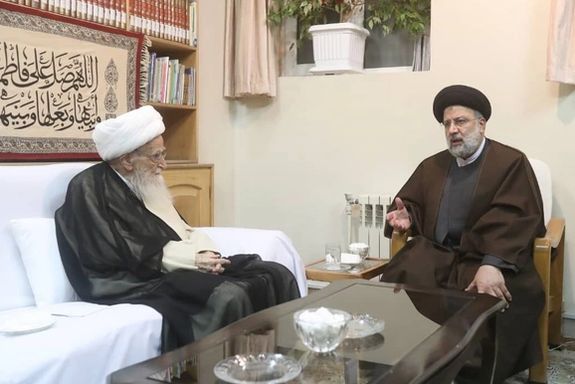
During his recent visit to Iran's religious center Qom, top Shiite clerics told President Ebrahim Raisi to end policies that have isolated Iran in the world.
The calls by top clerics came during the same week the Iranian parliament has been complaining about the Raisi administration's failure to mitigate the country's economic crisis.
Raisi spent two days this week in Qom where Iran's most senior ayatollahs and important clerical organizations, including the country's main seminary are located.
During his meetings with top clerics, Raisi has been reportedly seeking clerical endorsements for his government which is under attack by his political rivals as well as his allies at the parliament for failing to resolve the country's economic and foreign relations crises, as he had promised during his election campaign.
After five months in office, Raisi has not been able to address the dual crises. As the nuclear talks remain inconclusive, the impact of continuing US sanctions worsens Iran’s economic nightmare.
According to Khabar Online in Tehran, Grand Ayatollah Lotfollah Safi Golpayegani called on Raisi during his meeting with him on Friday to send Iran's message of peace and friendship to the world. The grand ayatollah also called on Raisi to be careful about the appointments he makes, without mentioning criticisms by clerics and parliamentarians over nepotism in the Raisi administration.
Like all the clerics who met with Raisi in recent days, Safi Golpayegani also urged him to immediately deal with the economic crisis, which is impoverishing the middle class and leaving the working class in need of food.
Earlier, another prominent cleric in Qom Ayatollah Abdollah Javadi Amoli also told Raisi that "Iran must negotiate with the rest of the world because it cannot live in isolation."
He said, "No one can be trusted [fully] in the international community, but at the same time, no one is needless of negotiations and relations with other countries," adding "We have to negotiate with them and shake hands with them whether we want or not, but we have to count our fingers afterwards."
This was a reference to the refusal of the Islamic Republic to directly negotiate with the United States, instead of European and other mediators. Several well-known pundits also urged the government to start direct talks with Washington.
On Friday, a leading seminarian and a professor of economics at the University of Qom, Seyyed Kazem Rajaei, told Raisi during a meeting that "the people might night tell you in your face about how much they are suffering from the country's economic crisis, but they tell me in the streets that they are fed up with your inaction and slowness." He warned Raisi "the train of Iran's economy is running loose on a steep downward track and might soon fall to the bottom of the gorge."
He also warned Raisi about raising the price of gasoline, as Raisi has also talked with top clerics about a new scheme to increase fuel prices hoping to get the clerics' blessing, although at least one top cleric, Golpayegani warned him against such a measure.
Meanwhile three Iranian newspapers pointed out on Thursday that attacks by politicians and lawmakers on Raisi and his cabinet is getting sharper as it was during a session of parliament on Wednesday where only a last-minute intervention by Speaker Mohammad Bagher Ghalibaf stopped an impeachment motion against economy Minister Ehsan Khanduzi.
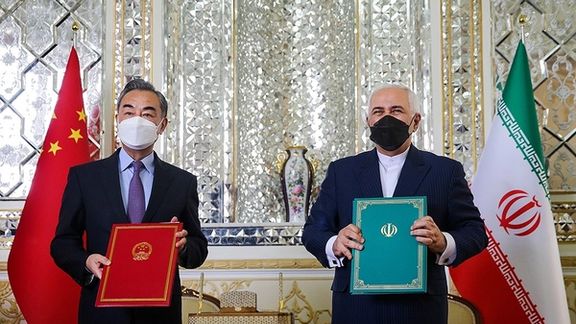
An ex-Iranian ambassador has said a new Chinese consulate in Bandar Abbas port city will foster Beijing’s economic presence on Iran’s Gulf of Oman coastline.
Mohammad-Hossein Malaek, former ambassador to China and Switzerland, told the Iranian Labour News Agency (ILNA) that Bejing anticipated a leading role in developing the Makran region, the coastal strip along Iran’s Sistan-Baluchestan province and Pakistan’s Balochistan, where Beijing already has a 40-year multi-billion-dollar agreement with Islamabad to develop Gwadar port.
Malaek added that China's decision to open its consulate in Bandar Abbas is a calculated move as the it will be able to offer support to the many companies that the Chinese expect to establish in Makran as well as those already active in Chabahar Free Trade and Industrial Zone and Bandar Abbas, Iran's most important southern sea transportation hub.
The Iranian cabinet approved the opening of the consulate, China’s first in Iran, December 29. Malaek pointed out that Iran had three consulates in China, which under the Vienna Convention entitled China to same number in Iran.
Majid-Reza Hariri, Chairman of Iran-China Trade Chamber, told ILNA that several agreements were signed during Chinese President Xi Jinping's visit to Tehran in 2016 to establish industrial towns in both the port of Jask, Hormozgan, and in Sistan-Baluchestan.
Hariri said cooperation would expand given 25-year strategic pact between the two countries, and that Chinese investment in south and south-eastern Iran − including oil, gas, petrochemicals, and infrastructure could also expand. Hariri said many Chinese citizens based in Iran lived in the region.
India already has a project for developing the port at Chabahar, which is only 170km west of Gwadar. Both ports aim at opening a trade corridor with Afghanistan and Central Asia.
Looking east
President Ebrahim Raisi has said he wants to expand relations with Iran’s neighbors and with both China and Russia, and that he plans on a visit to Moscow with the next few weeks to sign a strategic pact similar to the one signed with China in March 2021.
While some Iranians view with suspicion both the pact with Beijing and the proposed pact with Moscow, Beijing is already Tehran's top trading partner at around $19 billion and trade with Russia is around $2 billion despite US ‘maximum pressure’ sanctions introduced in 2018. China’s Belt and Road Initiative, covering 142 countries and including port development and sea routes as well as land links, has been estimated to give a $7-trillion annual boost to world GDP by 2040 and boost China’s political and economic influence, especially when it comes to isolated countries like Iran or Venezuela.
China and Russia both reduced economic connections with Iran after the US began ‘maximum pressure,’ which threatened punitive action against any third party buying Iranian oil or dealing with its financial sector.
But whereas Iran’s European oil customers and US-allied Asian customers stopped buying Iranian crude, Chinese companies have been buying 600-700,000 barrels a day through unofficial channels.